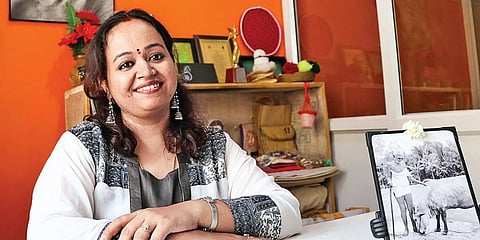

For 26-year-old Vidyasagar suffering from Down's syndrome, the lockdown meant being confined to home with no access to his playmates and teachers at the Rasa Aadhara in Bengaluru. This one-of-its-kind institute in Malleshwaram believes in building life skills rather than focussing on academics in handling students suffering from autism, Down's syndrome, cerebral palsy, chromosomal disorders and other learning disabilities.
Howvever, the pandemic, however, posed a challenge to their functioning. But centre head Rupa Hemanth would not give up. "My children have every right to be occupied just like everyone else," she resolved.
Difficult as it was, the centre had to make the transition to online in the last few months. The students were divided into batches of three for each teacher. Sessions of storytelling, art and craft were conducted via live WhatsApp video calls while dance and music lessons were recorded and sent to students.
Vidyasagar had found his lost happiness. His younger brother Mohit says, "Sagar really enjoys the online sessions and looks forward to them. He has been with the school since the last six years and has learnt to think before expressing himself. He has also learnt to play percussion instruments very well."
Since its inception in 2013, the centre’s focus has been on overall development. Currently comprising 28 students, aged between 17 and 41, and divided into three batches with four teachers and assistants dedicated to them, a day at the centre is always packed with numerous activities.
The shift to online is not without its hurdles. "It is a tough task to get the attention of the children especially those who need help with basic tasks such as walking, grooming and eating. They need to be coaxed to see the screen but we have had the support of the caregivers at home. In fact, it has been a blessing as parents now realise what their kids do in school and how much they have progressed," says Hemanth.
The centre uses the methodology of Theatre Arts for Holistic Development (TAHD) through tools such as dance (movements), music, storytelling, arts and crafts, to impart lessons. The team at the centre prepares a detailed assessment of each child based on his/her abilities, including gross motor skills, level of coordination, intellectual capacity, etc.
The students are then divided into three groups as per their needs. Depending on the group, the goals can be as basic as being able to walk properly, open a bottle, squeeze gum or even cut paper in a given shape. “While we do have a structured method of learning, we try to go with the flow of the children and make each session enjoyable,” says Hemanth.